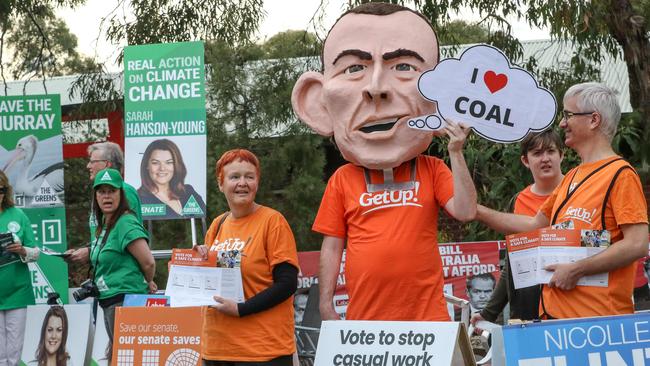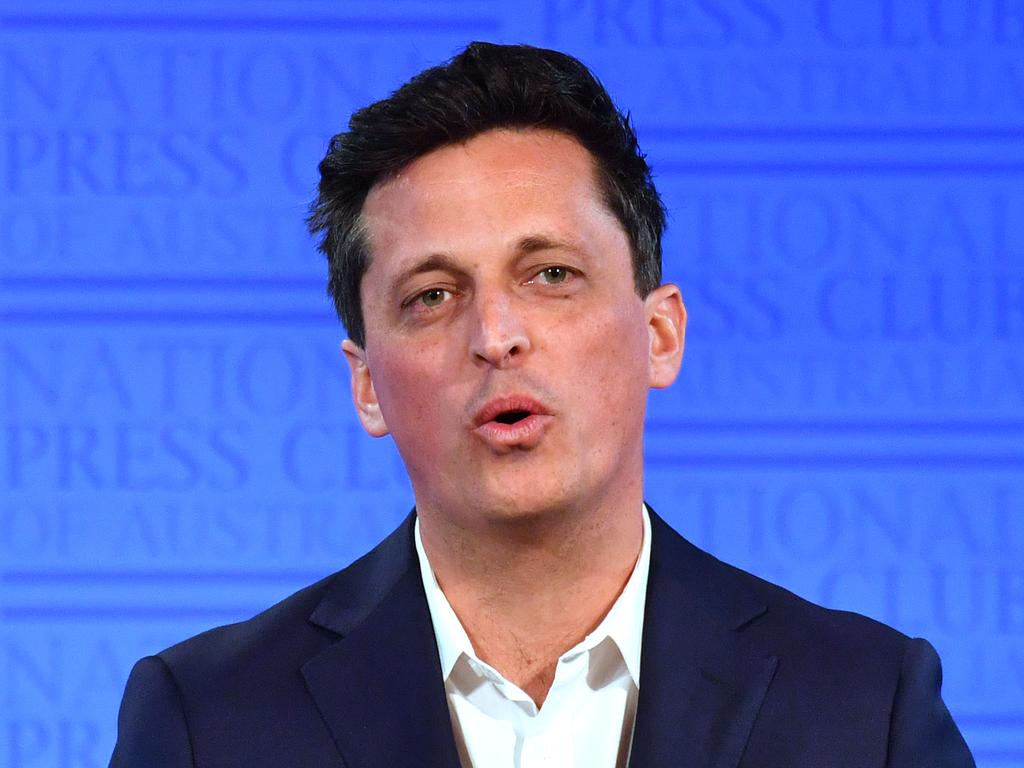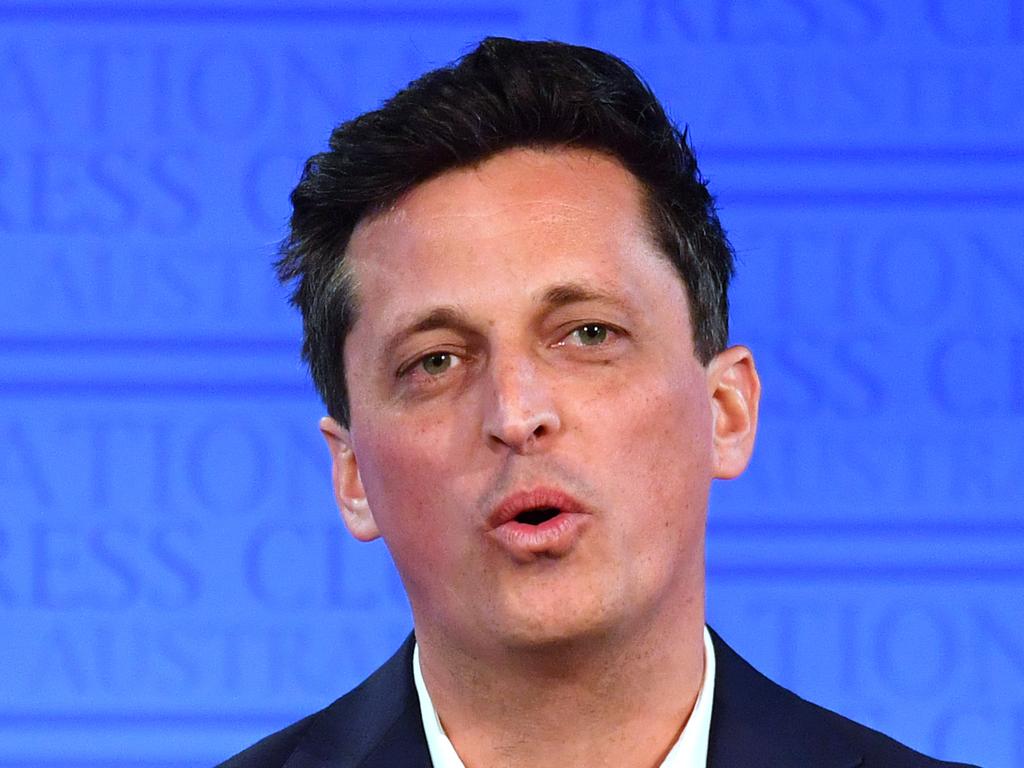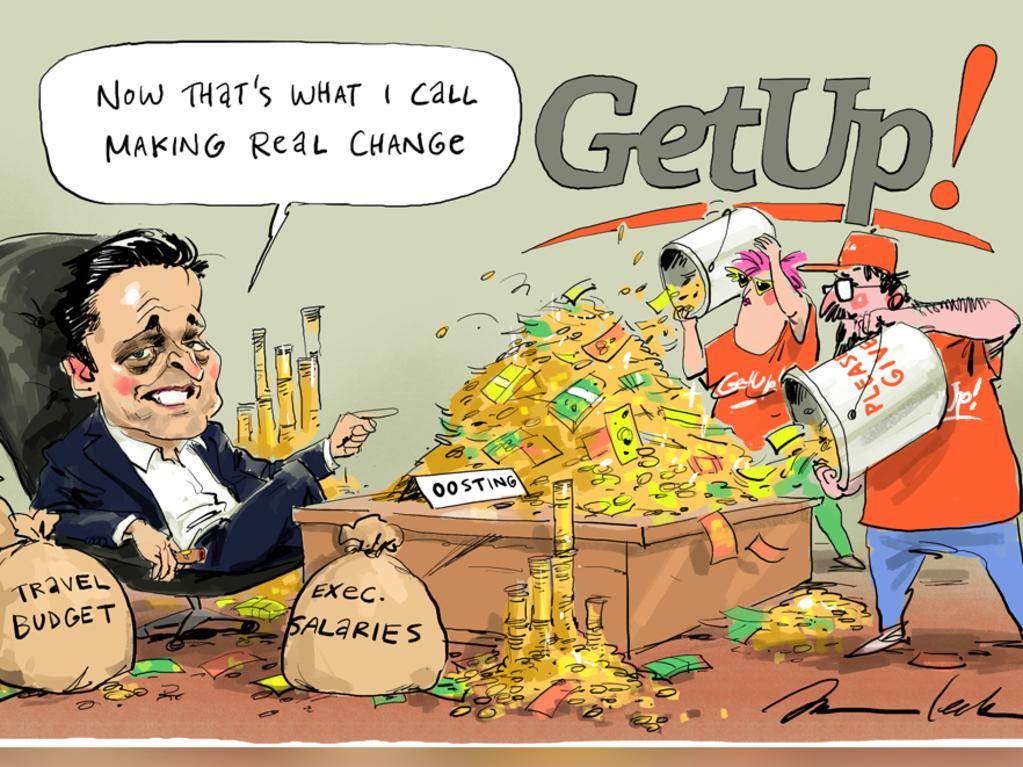GetUp: Power to the people? Not for this ‘grassroots’ group
GetUp paints itself as vital for our democracy, but its rhetoric does not match its behaviour.

There should be a valuable place for GetUp in the nation’s political life, based on its glowing self-description as a fiercely independent movement of more than one million people working “to build a progressive Australia and bring participation back into our democracy”.
We’re talking high ideals here, an epitome of civil society in action. GetUp is a not-for-profit, issues-based campaign organisation. Proudly people-powered, it is promoted as a voluntary community of citizens outside political parties that claims to represent its members’ interests from top to bottom.
Even conservatives such as Scott Morrison, while disagreeing with GetUp’s left-leaning activist objectives, have no ground for complaint, right?
If only GetUp’s rhetoric matched its behaviour.
The essence of news coverage this week in The Australian about GetUp spending $7.2m on salaries last year, according to its 2019 financial report, was that the bulk of funds raised from public donations went on staff.
That figure might not seem too high, as a proportion of funds raised, for charities such as the Red Cross or St Vincent de Paul that deliver humanitarian services.
All sizeable charities or not-for-profits need to pay employees and have running costs.
But here is the nub. A group of longtime GetUp team leaders and other supporters argue that a volunteer-based movement should put as much money as possible into frontline “campaign expenses”, certainly more than the current proportion of donations, when they are doing a lot of the grunt work.
Compared with political parties, which also rely heavily on volunteers, GetUp is top-heavy on salaries for a “movement” that took a total of $12.4m in donations. Donations were boosted by $806,500 from other income.
When you add the $7.2m salary expenditure for six top executives and 50 low-level staff to other spending listed on GetUp’s 2019 profit-and-loss statement, the running costs mount up. GetUp also spent $1.4m for administration, $806,000 for rent and $507,000 for travel to fly national director Paul Oosting and other executives around the country.
Just $3.6m was left for core campaign expenditure. That might sound like a lot of money, but it is just 29c in the dollar for an organisation that makes constant public appeals and talks up where every dollar goes. Disillusioned supporters look at GetUp’s poor federal election results last year where only one targeted MP, Tony Abbott, lost his seat. They don’t think $3.6m was a sufficient spend for maximum impact.
GetUp’s website spells it out in plain English: “Every dollar you donate to GetUp is used to build a more fair, flourishing and just Australia. Your donation will be used to fund billboards to get our messages in front of key decision makers, hard-hitting TV ads into the lounge rooms of key electorates and rallies demonstrating people power.”
GetUp national director Oosting’s response, when initially asked by The Australian for comment about the financial report figures, said paid staff were “some of the greatest assets” and the “driving force” behind campaigns.
A GetUp spokeswoman later deflected to different wording in the group’s 2019 annual report, which takes a much looser view by saying 89 per cent of income went to “campaign-related” expenses. That blurry percentage included salaries.
Volunteers from Brisbane, Gosford, Wollongong and Canberra have expressed dismay, including on the group’s internal “Slack” communications system, about difficulties in getting access to financial information from GetUp’s leadership. They have protested about their treatment during last year’s election campaign. Some have already quit or claim to have been forced out for raising questions.
This gets to the nub of GetUp’s problem. Democratic? People-powered? Grassroots? Independent? Such values are not reflected in how GetUp is actually run.
Based on its constitution, as amended in 2018, GetUp is a company limited by guarantee. The only “full members” are nine board directors who have complete control. There are three other “founding members” with no role but given the title as recognition for starting GetUp in 2004.
GetUp says it has “more than a million” members. Sometimes it is more specific, as it was in the 2019 annual report with “998,652 members”. It says there were 70,000 individual donors last year and identifies 15,417 “core” members who made small regular contributions. The group’s post-election review said GetUp had 9433 volunteers for phone banking, doorknocking and voting booths.
That’s a fair sum of volunteers, but suddenly “GetUp army” numbers are looking a bit more realistic and, as GetUp’s board well knows, no one except themselves and the three founders is a member. They’d be lying to say otherwise.
The rest are supporters, volunteers and a much larger number on an imprecise email list that is not updated and could include anyone, including people now deceased.
These alleged “million members”, who are not really members, have no real say in GetUp’s structure. They are kept at arm’s length from an opaque decision-making hierarchy that dislikes scrutiny. The board does commission online surveys of what supporters think are priority campaign issues, but feedback levels are very low as a proportion of the members GetUp claims publicly.
The board also exercises its right to bypass survey results in choosing which campaigns to pursue or prioritise. Here’s an example: climate change and asylum-seekers typically show up as top issues in surveys. Yet GetUp chose health and hospitals for the 2016 federal election, normally a lower priority but conveniently coinciding with Bill Shorten’s (false) campaign claim that Malcolm Turnbull wanted to privatise Medicare and seriously cut back on hospital spending.
For the federal election campaign last May, now disenchanted GetUp team leaders have told The Weekend Australian, they were told to downplay immigration. Indeed, not mention it. Why? One plausible reason, they say, was that GetUp’s top brass did not want to make life difficult for Shorten’s second go at becoming Labor prime minister because his party’s asylum-seeker policy, at its heart, was little different to the Coalition’s.
Which brings us back to GetUp’s leadership, and claims of independence. Five of GetUp’s nine-member board, until Phil Ireland stepped down as chairman last week, were Labor Party members or had Labor pedigrees. Over time, Greens have been represented too. The Australian Electoral Commission has rebuffed several attempts by the Coalition to have GetUp classed as an “associated entity” of Labor and/or the Greens. To do so would badly undermine independence claims.
But it is plain to see, on the facts, that GetUp has important allegiances at board level that are Labor, and who tick-tack with Labor outside GetUp board hours. Shorten was once on the board too. He gave big amounts of union money to GetUp, the total sum of which remains unclear. GetUp’s is really a club of board directors, most professional activists, who control the money and have full say over who joins their club when one of them leaves.
GetUp, by the way, is not a charity. It is a not-for-profit company limited by guarantee that has historically not paid income tax after recording annual deficits.
Yet, while its activities are political, GetUp did have the words “charitable purpose” in its constitution until recently. It almost implies it is one by stating in financial reports that it complies with the NSW Charitable Fundraising Act.
It is difficult to compare GetUp with other campaign movements such as Amnesty International, the World Wildlife Fund, the Australian Conservation Foundation or Greenpeace. These others operate in a political space, but do not hand out how-to-vote cards. They are more democratic too. Unlike GetUp, many have actual grassroots members who can elect governing council members.
As this week has rolled past, the response of Oosting to The Australian’s reporting of running costs and growing disenchantment among some followers about an alleged lack of transparency was to lash out in emailed funding appeals to members. They alleged the reports, written by me, were “riddled with errors”, “misread our financial statements”, “attacked us for paying our staff” and came from a “Murdoch press” monolith that needed to be silenced (in a free press democracy). The scrutiny was not legitimate but “hand-in-glove with hard-right members of parliament to attack our movement”.
Oosting can talk some good baloney. It would seem the mention of a $7.2m salary bill has touched a raw nerve.








To join the conversation, please log in. Don't have an account? Register
Join the conversation, you are commenting as Logout